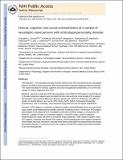| dc.contributor.author | Dickey, Chandlee C. | |
| dc.contributor.author | McCarley, Robert William | |
| dc.contributor.author | Niznikiewicz, Margaret A. | |
| dc.contributor.author | Voglmaier, Martina M. | |
| dc.contributor.author | Seidman, Larry Joel | |
| dc.contributor.author | Kim, Sunnie | |
| dc.contributor.author | Shenton, Martha Elizabeth | |
| dc.date.accessioned | 2016-09-28T20:27:46Z | |
| dc.date.issued | 2005 | |
| dc.identifier.citation | Dickey, Chandlee C., Robert W. McCarley, Margaret A. Niznikiewicz, Martina M. Voglmaier, Larry J. Seidman, Sunnie Kim, and Martha E. Shenton. 2005. “Clinical, Cognitive, and Social Characteristics of a Sample of Neuroleptic-Naive Persons with Schizotypal Personality Disorder.” Schizophrenia Research 78 (2-3) (October): 297–308. doi:10.1016/j.schres.2005.05.016. | en_US |
| dc.identifier.issn | 0920-9964 | en_US |
| dc.identifier.uri | http://nrs.harvard.edu/urn-3:HUL.InstRepos:28623242 | |
| dc.description.abstract | Introduction: Schizotypal personality disorder (SPD) shares with schizophrenia many biological features, yet little is known about the clinical characteristics of persons diagnosed with this disorder. This report describes the clinical, cognitive and socio-occupational characteristics of a community sample of subjects diagnosed with SPD. Method: Sixty-four male and 40 female neuroleptic-naive DSM-IV SPD subjects and 59 male and 51 female comparison subjects were recruited from the community for a total sample of 214 subjects. Demographic and cognitive differences between groups and, within the SPD group, the effect of gender on clinical features, such as the SPD criteria, SAPS, SANS, Schizotypal Personality Questionnaire, and co-morbidity, were examined using ANOVA and Chi-square distributions. Results: SPD subjects, in contrast to comparison subjects, had significantly lower socio-economic status, poorer social relationships and skills, and lower vocabulary scores. Furthermore, SPD subjects demonstrated more impairment on Vocabulary scores than on Block Design, as measured by the WAIS-R, a pattern not seen in comparison subjects. In the SPD cohort, positive symptoms predominated and nearly half were co-morbid for major depression. With respect to gender, male SPD subjects, compared with female SPD subjects, evinced significantly more negative symptoms, fewer friends, had more odd speech, and were more likely to also suffer from paranoid and narcissistic personality disorders. In contrast to male SPD subjects, female SPD subjects perceived themselves to be more disorganized. Conclusions: SPD subjects, similar to schizophrenics, are impaired socially, occupationally, and cognitively, particularly in the area of verbal measures. Moreover, male SPD subjects may be more severely affected than female SPD subjects across multiple domains of functioning. | en_US |
| dc.language.iso | en_US | en_US |
| dc.publisher | Elsevier BV | en_US |
| dc.relation.isversionof | doi:10.1016/j.schres.2005.05.016 | en_US |
| dc.relation.hasversion | https://www.ncbi.nlm.nih.gov/pmc/articles/PMC2766931/ | en_US |
| dash.license | LAA | |
| dc.subject | schizophrenia | en_US |
| dc.subject | schizotypal personality disorder | en_US |
| dc.subject | gender | en_US |
| dc.subject | clinical | en_US |
| dc.subject | demographics | en_US |
| dc.subject | IQ | en_US |
| dc.title | Clinical, cognitive, and social characteristics of a sample of neuroleptic-naive persons with schizotypal personality disorder | en_US |
| dc.type | Journal Article | en_US |
| dc.description.version | Accepted Manuscript | en_US |
| dc.relation.journal | Schizophrenia Research | en_US |
| dash.depositing.author | Shenton, Martha Elizabeth | |
| dc.date.available | 2016-09-28T20:27:46Z | |
| dc.identifier.doi | 10.1016/j.schres.2005.05.016 | * |
| dash.identifier.orcid | 0000-0003-4235-7879 | en_US |
| dash.contributor.affiliated | Dickey, Chandlee | |
| dash.contributor.affiliated | Seidman, Larry Joel | |
| dash.contributor.affiliated | Voglmaier, Martina | |
| dash.contributor.affiliated | Niznikiewicz, Margaret | |
| dash.contributor.affiliated | Shenton, Martha | |
| dash.contributor.affiliated | McCarley, Robert William | |
| dc.identifier.orcid | 0000-0003-3191-2005 | |
| dc.identifier.orcid | 0000-0001-5705-7495 | |


